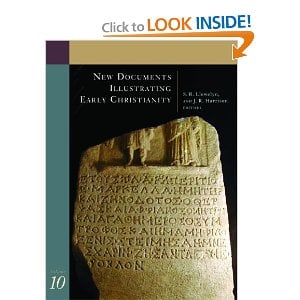Another of the very helpful entries in New Docs. Vol. 10 involves and inscription from Ephesos/Ephesus and its explanation and implications spelled out by J.R. Harrison, one of the new editors of the series along with Stephen Llewelyn. The inscription is from about 22 B.C. and is found in both Latin and Greek. The Greek reads “By Caesar Augustus’ grace (xapiti) from the sacred revenues which he himself freely gave to the goddess [Diana/Artemis] a road was laid under the proconsul Sextus Appoleios.” What we are dealing with is part of what came to be called ‘the Augustan age of grace’ or better put the patronage and beneficence being dolled out to cities and temples going along with Roman rule and Romanization in general. The famous Priene inscription of 9 B.C. reflects the rapturous response of the locales to the benefits the sugar daddy emperor was dolling out, including paving of roads, in this case probably the via sacra leading to the temple itself. And this in turn brings us to Paul’s letter to the Ephesians.
As Harrison rightly notes, Paul is writing in a manner or vein that shows that Christ’s grace far exceeds that of the Imperial Sugar Daddy. What Harrison does not note is that the hyperbolic praise of Christ in Ephesians volumes the typical forms of Asiatic rhetoric and in this case epideictic Asiatic rhetoric used in this very locale to laud the Emperor.
The language of grace (Ephes. 1.2-7; 2.5-8; 3.2-8; 4.7,29; 6.24) is sprinkled through out this circular letter/slash paean of praise and one thing Paul is countering is the imperial prosperity religion. Christ’s benefits are far better, suggests Paul. (Cf. Acts 19.23-25/ Dio Chrysostom Or. 31.54). As Harrison rightly stresses, not merely the language of grace/benefit, but the language of wealth and glory in Ephesians crops up regularly as Paul contrasts what we have in Christ compared to what the Emperor provided. The difference of course is that imperial grace comes with strings attached, and sets up a reciprocity cycle. Christ’s grace provides unmerited benefit. It is in fact Christ who is reconciling the nations to himself by his grace, not the Emperor who is incorporating all these nations into a self-serving Empire.
There is much more to Harrison’s analysis than this synopsis can provide, so I commend pp. 59-63 to you in New Docs Vol. 10.












